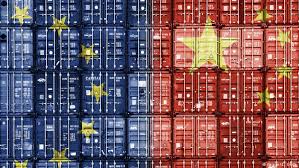EU needs unified stand to conclude BIT with China

Global Times - 09 May 2019
EU needs unified stand to conclude BIT with China
By Zhou Zheng
During the China-EU summit on April 9 in Brussels, Belgium, the two sides were committed to achieving "decisive progress" for the conclusion of a China-EU Comprehensive Investment Agreement in 2020 - the bilateral investment treaty (BIT) between China and the EU. Against the backdrop of a triangle of China-EU-US complications, China needs to rethink how to negotiate the BIT with an EU with diverging views on China.
In late April, as the special representative to the second Belt and Road Forum, Vice President of the European Commission Maros Sefcovic said the EU is ready to forge meaningful synergies in dealing with China. German Economy Minister Peter Altmaier reportedly mentioned during the forum that major EU countries "have agreed" to "together make necessary arrangements" rather than signing any bilateral memorandums.
But the EU countries have taken different tones when it comes to building relationships with China. Italy and Switzerland have signed up for the Belt and Road Initiative (BRI), serving as a wake-up call for European countries to rethink their approach to cooperating with China. As a whole, the EU would like broader investment in China and is attracted to Chinese investment. However, countries within the EU are taking different stands.
As two important founding members of the EU, Germany and France do not share a consensus on how to deal with China. Germany fears the competition of Chinese companies. The fast-growing Chinese manufacturing industry may put pressure on Germany’s Industrial Strategy 2030. Germany in December lowered the threshold for foreign investment screening to fend off a potential takeover by Chinese companies. German Foreign Minister Heiko Maas urged the EU countries to stay united against China. Italian diplomatic sources said Germany has been exerting pressure behind doors in Rome, Berlin and Brussels, though the German government has not publicly attacked Italy for joining the BRI, media reported.
France has taken more of a condescending attitude. French President Emmanuel Macron wants the EU countries to jointly deal with Chinese advances in trade and technology and would like to obtain more benefits for French companies. But he has not been eager for Chinese investment. Similar to the Northern European countries, France has focused on China’s human rights, bringing it up during the top-level meeting in March.
Countries such as Italy and Greece, which are facing a difficult economic situation and debt problems, have seen real benefit in joining the BRI and made a pragmatic decision. Central and Eastern European countries have already cooperated with China on BRI projects.
The mutually beneficial BIT has great prospects for both the EU and China as a firm foothold for a future free trade agreement. According to a report released by China Council for the Promotion of International Trade, the amount of money spent on mergers and acquisitions (M&A) in the EU from Chinese enterprises exceeded 50 percent of total M&A cost in 2018. And the less rosy forecast of 1.3 percent EU GDP growth by the EU Commission in 2019 earlier this year has made Chinese investment more important.
But it could be challenging to develop a relationship with the EU. It is not China that is trying to divide the EU. It is the EU that has a hard time uniting. Especially for the BIT, European countries need to come up with unified requirements and standards. Otherwise, each country will have to blindly follow the US.
In the China-EU-US triangle, the US has gained the upper hand, using the progress on trade negotiations with China and the EU as bargaining chips in talking with the other party. While China-US trade talks were giving off positive signals, the Trump administration threatened to levy tariffs on the EU due to the disagreement on agricultural trade barriers and subsidies for the European aircraft group Airbus.
Better communications with EU countries and the EU as a whole are needed. Since the EU has no unified standard for the BIT, China will have to inevitably engage in bilateral talks with each individual European country as well as coordinate with them on the EU level.
To brush away US influence in the BIT negotiations, China will have to listen to and learn the needs of European companies that have invested or are ready to invest in the Chinese market. And as the European Union Chamber of Commerce in China has stated on its website, European businesses in China seek greater market access and improved operating conditions.





